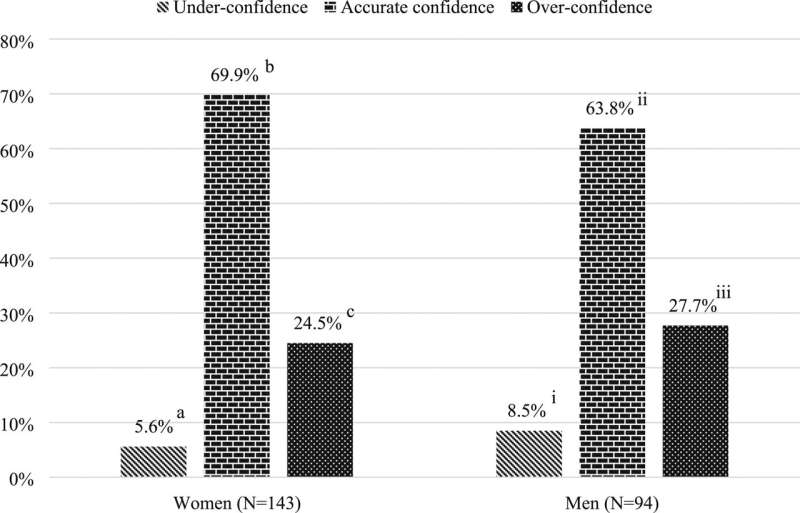This article has been reviewed according to Science X's editorial process and policies. Editors have highlighted the following attributes while ensuring the content's credibility:
fact-checked
trusted source
proofread
Research counters 'confidence gap' stereotype for women entrepreneurs

According to one prevalent gender stereotype, women are "under-confident" in their ability to thrive as entrepreneurs. But like so many gender stereotypes, this one turns out to be false, says Jennifer Jennings, a professor in the Alberta School of Business and Canada Research Chair in Entrepreneurship, Gender and Family Business.
In an article published in Entrepreneurship Theory and Practice, Jennings and co-authors Zahid Rahman and Dianna Dempsey found instead that "women are as likely as men to possess accurate entrepreneurial confidence" or entrepreneurial self-efficacy.
Men, on the other hand, by a small margin, were more likely to be overconfident. This characteristic was found to be associated with a lower likelihood of seeking opportunities for improvement—and a higher likelihood of launching a risky venture or over-committing to an unpromising venture.
In looking at data from the Global Entrepreneurship Monitor, Jennings and her team noted that the rate of participation in entrepreneurship by women is as much as 20% lower than the rate for men. They were skeptical of the widely held belief that women's supposed under-confidence is a key cause.
Questioning this perception is important because training policy often reflects the assumption that the perceived confidence gap is a "female deficiency" that needs to be addressed, says Jennings.
"Accordingly, women are often counseled to correct this 'problem' by taking steps to strengthen their entrepreneurial self-efficacy, whereas men are assumed to 'naturally' possess the appropriate amount."
In two separate studies—a lab study conducted at the University of Alberta and a survey sent out to adults in the United States and the U.K.—male and female participants were required to carry out entrepreneurial-related exercises, then evaluate their own performance afterward without knowing how they scored.
The first study showed that about 70% of the women "exhibited accurate confidence in their opportunity evaluation knowledge," write the authors, with their self-assessment aligning with the objective score. Only six percent exhibited under-confidence, and 24% showed overconfidence.
Of the men, about 64% had accurate confidence in their performance, while 8% were under-confident and 28% were overconfident.
Jennings and her colleagues also wanted to examine the assumption that a "swashbuckling overconfidence" is good for entrepreneurship. This may be a characteristic that helps in launching a business, says Jennings, but does it necessarily help an entrepreneur do better in the long run?
As it turns out, those who overestimated their performance on the entrepreneurship-related tasks—men or women—were "less willing to engage in behaviors that are arguably beneficial for business ventures" such as scrutinizing their performance to see where there is room for improvement.
"In the second study, we gave the participants several scenarios related to owning a business, and those who were overconfident—once again, men and women alike—were more likely to introduce a really risky, highly innovative product with a slim chance of success."
"They were also significantly more likely to escalate commitment, or continue to dump money into a failing product."
Jennings has spent much of her career looking at the differences between men and women as business owners, seeking to better understand both the challenges and opportunities that female entrepreneurs face.
Her latest study is one more attempt to dispel prevailing assumptions about women entrepreneurs.
"Our analysis offers compelling evidence for questioning predominant beliefs about women's (and men's) entrepreneurial confidence," write Jennings and her co-authors.
"Counter to common depictions of women as under-confident with respect to entrepreneurship, we show that they are just as likely as men to possess accurate self-assessments of their entrepreneurial potential."
More information: Jennifer E. Jennings et al, Challenging What We Think We Know: Theory and Evidence for Questioning Common Beliefs About the Gender Gap in Entrepreneurial Confidence, Entrepreneurship Theory and Practice (2022). DOI: 10.1177/10422587221102108
Provided by University of Alberta




















